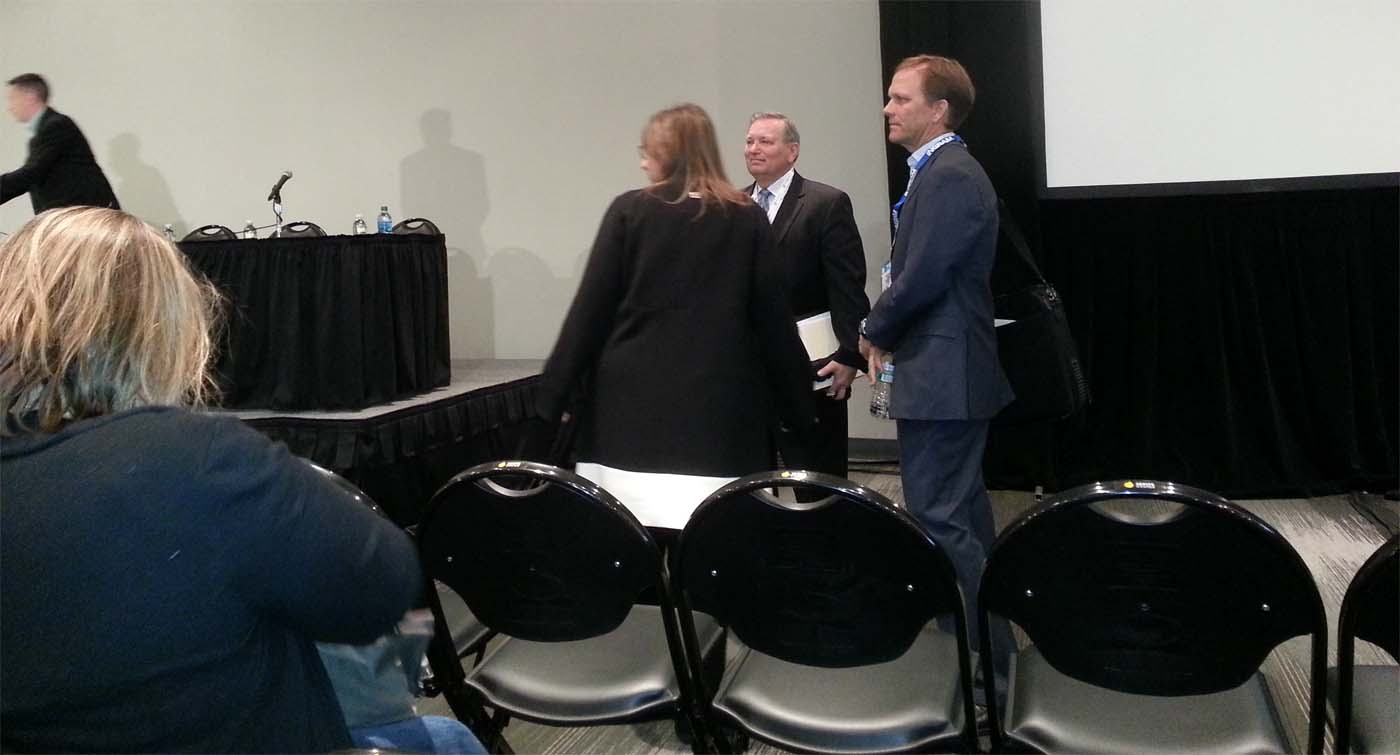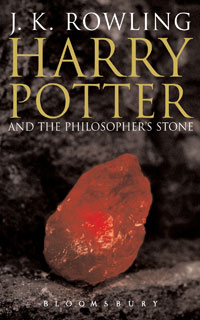Imagine being forced at gunpoint to attend the world’s most useless corporate retreat without a compassionate euthanasist offering suicide capsules and you have a pretty good idea of what BookExpo America has turned into. The conference is now so cheap that the badges no longer come with lanyards, leaving one to pin the back of the badge to one’s coat using the feeblest metal imaginable. The printed schedules don’t list all the sessions, much less offer a detailed description. The website is unnavigable, leading one to use arcane Google skills to extract the most basic details. And the information offered at ABA is less helpful than the world’s most ineptly written self-help book.
In short, this trade show is now a racket. And everybody knows it. On Wednesday afternoon, John Ingram looked especially embarrassed to be spouting off such horseshit as “To me, it’s about engaging community and creating innovation” at “The Future of Bricks and Mortar Retailers” panel. And I genuinely felt sorry for him. Was there any need for Ingram’s time to be wasted like this? There was no mention of the recent Amazon-Hachette dispute, except in knowingly veiled code. And that approach seemed especially condescending given that the great and irreplaceable Maya Angelou had passed away that morning.
I couldn’t help but contrast this panel against Richard Russo’s candid and inspiring words (with much healthy vitriol directed at Amazon) to booksellers only two years before. Indeed, BookExpo now carries a bizarre prohibitionist instinct. For the first time ever, there are signs forbidding people from filming the panels, as if tired sentiments about the “either and” future of print and digital were on the level of Coronado discovering the Seven Cities of Gold. The annoyingly peppy moderator Dominique Raccah kept referencing a “pre-interview” she conducted with the five participants, as if this atoned for the vapid predictability of her questions. I had to stop myself from approaching the stage to pin a gold star on her lapel for the job well done she courted. I counted twelve disappointed souls storming out, the telltale screech of the heavy doors competing with the unfathomably soft levels of the amplification system. The crowd was half as numerous as last year.
Now I’m no stranger to complaining about BookExpo, but I’ve always found something that I could take away from it. Yet this year is easily the worst of the nine I’ve attended. It is slapdash, slipshod, motivated by a kind of naked avarice more cartoonish than The Wolf of Wall Street. It was clear from the giant posters devoted to Jodi Picoult and David Mitchell that the chief goal is to eliminate the trade element entirely and turn this into a Comic-Con for books.
How did it get like this?
Well, BookExpo went after the book trade until much of the small and midsize exhibitors could no longer afford to pay for the exorbitant booths (the pricing remains secret, but like anything in business, getting the right rates are about who you know). Then BookExpo somehow persuaded bloggers to pay for the privilege of feeling special with the Book Bloggers Convention (still happening this year, but will it be around in 2015?), fleecing these amateurs of their hard-earned pin money. But the bloggers aren’t nearly as plentiful or as influential as they used to be. BookExpo remains stuck with Jacob Javits Center through 2017. So what do you do? You turn to ordinary readers, viewing them as boobs that fit the Barnum ideal. You charge them $30 a pop, get eight thousand of them to pay, and hope that the reckless math holds out with BookCon, a new last-ditch attempt to salvage your Hindenburg by opening the show to the public on Saturday.
“I always joke that every BookCon fan should have at least six figures of student loan debt,” said BEA flack Lance Fensterman to reporter Boris Kachka. “We’re trying to find the passionate fan base.” One can’t help but ponder the perfidy of this statement. BEA isn’t about sharing the wealth or even learning from the booksellers. (At the B&M panel, Tattered Cover owner Joyce Meksis was rightly cheered for the 500 to 600 events she organizes yearly.) The strategy involves fleecing the last few dollars from the public and encouraging them to demand free books from the publishers, who will in turn have to pay for galleys that are usually offloaded to avid booksellers. And no one seems to see the disastrous conflagration ahead at the air station.
The people who make books their business are not to be blamed for this. I watched many of their spirits brighten once they emerged from the crippling Kafkesque church of Jacob Javits Center. Their minds purred upon their escape, pondering the creative accounting they’d need to exact to justify the raid on the minibar. Yet while Jacob Javits’s dull white corridors still retain their architectural power to crush robust souls, it was more empty this year, even emptier than it usually is on the first day. The publishers and booksellers are going elsewhere to do their deals. Most people know that this is not their space. BookExpo has failed to learn that you don’t just need a showroom for books. You need heart, soul, knowledge, and instinct. While Fensterman and his cronies are cynical enough to believe that people will give that all up for a pittance, I remain quite confident that this gargantuan exposition won’t last long beyond the Javits contract. Unless someone replaces the lifting gas.


 Why didn’t these capable titans refer to readers by their rightful name? Perhaps talking about readers in human terms interfered with business operations. Freidman said, “We want to get to them quicker, more efficiently.” This would be done by “marketing extensively.” I didn’t know whether to be more alarmed by Friedman’s crude reliance on adverbs or her suggestion that passionate readers are malleable cyborgs.
Why didn’t these capable titans refer to readers by their rightful name? Perhaps talking about readers in human terms interfered with business operations. Freidman said, “We want to get to them quicker, more efficiently.” This would be done by “marketing extensively.” I didn’t know whether to be more alarmed by Friedman’s crude reliance on adverbs or her suggestion that passionate readers are malleable cyborgs.